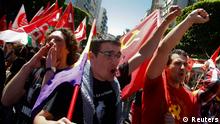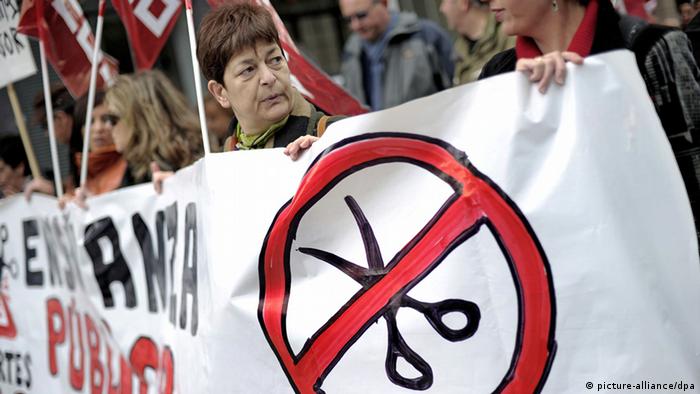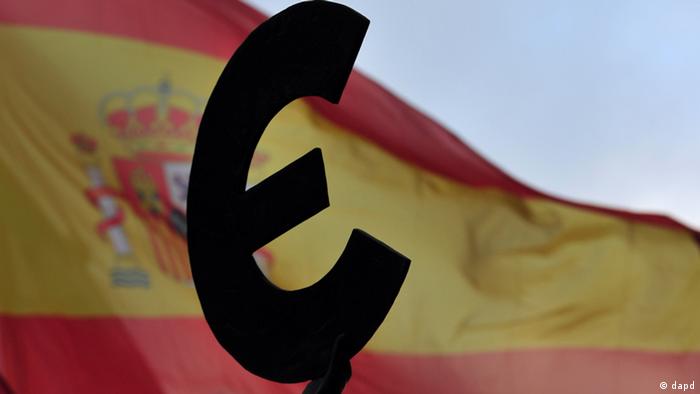As Spain trembles on the precipice of becoming the next EU member to require bailout funds, the government in Madrid has nationalized one of Spain's largest banks in a bid to shore up its ailing financial sector.
The Spanish state announced on Wednesday it would take a 45-percent stake in Bankia SA, the country's fourth largest bank, by converting a state-backed loan into bank shares, effectively meaning that it would "take control" of the struggling institution.
The rescue of Bankia, which has nearly imploded as a result of people being unable to pay loans they took out during Spain's housing boom, comes as Madrid is planning to overhaul the entire financial sector and help it cope with the burden of the property crisis.
For the Spanish economy, the burst the property bubble has left banks scrambling to clean up their balance sheets, thus unable to issue loans, which analysts say is primarily to blame for the current lack of economic activity and ensuing employment crisis.

Protests are intensifying all over Spain
Around half of young Spaniards are unemployed, but Madrid remains unable to help as it is forced to implement massive austerity cuts from Brussels. Spain's debt levels are some of the highest in Europe, and observers have been warning since last year that the Spaniards are next in line for EU/IMF bailout funds.
Return of the 'indignants'
It seems with each coming day that another protest is held against the cuts introduced by the four-month-old government of Mariano Rajoy. A recent march through central Madrid was led by labor unions who warned that the current austerity drive was the real cause of the Spanish disaster.

Rajoy's government is young, but cuts are already biting deep
The country is back in recession and it has the highest overall jobless rate in Europe. The government has promised to change this and get the economy growing again, but it has also told the European Commission that it will slash its deficit this year, from 8.5 percent to just over 5 percent.
"This is more than a steep challenge," economist David Gomez from Madrid's Rey Juan Carlos University said in an interview with DW.
"That's a huge cut in public spending they have promised. So of course, that means cutting expenses all around and that basically means all sectors in the Spanish economy."
The situation has given rise to massive protests and, a year after taking over Spanish streets and squares, the "indignants" are staging a comeback.
The activists, who once led hundreds of thousands into the streets, are launching a four-day protest from May 12-15, ending on the anniversary of the movement's birth in Madrid's Puerta del Sol.

The Spanish are saying a resounding NO to the government's cuts
Fed up
The government says cutting the deficit is the only way to restore confidence in the beleaguered Spanish economy. But while Rajoy has a majority in Congress, enabling him to push through his controversial measures, most other political parties aren't convinced.
Youth unemployment is at over 50 percent and like many young Spaniards, Sergio is starting to look abroad for work. But he fears for his students.
"If they don't get a good education in this globalized world, it's going to be very difficult for them to compete with French students, with German students or even with English students, and so it's going to be very difficult for them," he told DW.
Spain watched the recent French presidential election closer than most nations. Many of those here who want to see more emphasis on growth, see the election of Francois Hollande as a sign that the tide could be turning against austerity.
While the debate over the merits of austerity rages on across Europe, Spain is feeling its effects more than most. Teachers have announced a national strike for May 22, and with the economy shrinking and unemployment expected to keep rising this year, many more protests are anticipated in the coming months. If austerity is indeed the answer, Spaniards are a long way from accepting it.
Authors: Guy Hedgecoe, Gabriel Borrud (with information from AFP and Reuters)
Editor: Neil King
Editor: Neil King


No comments:
Post a Comment